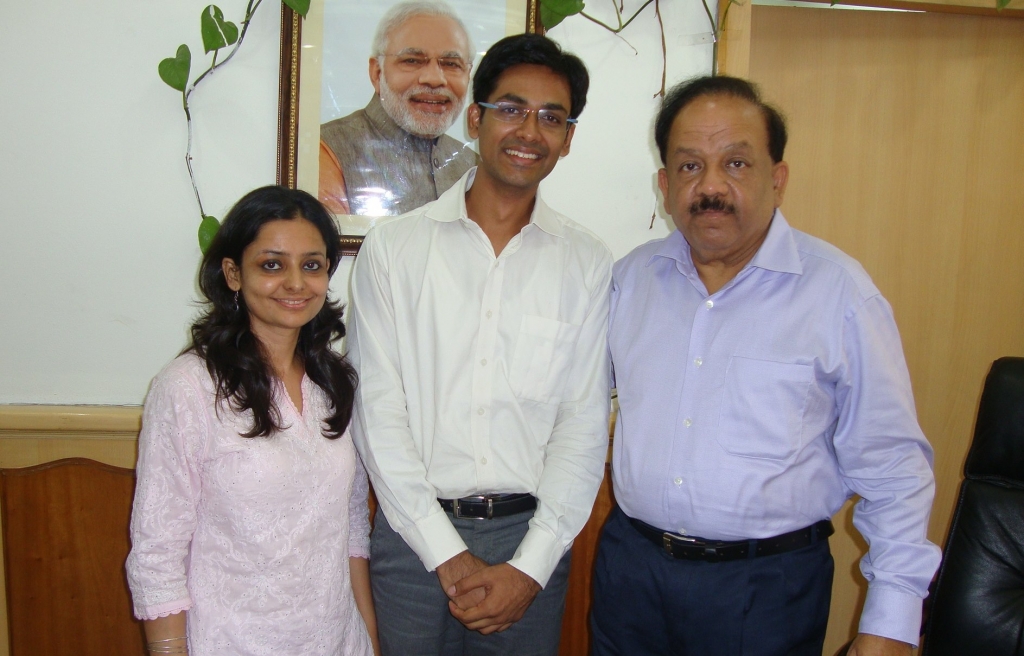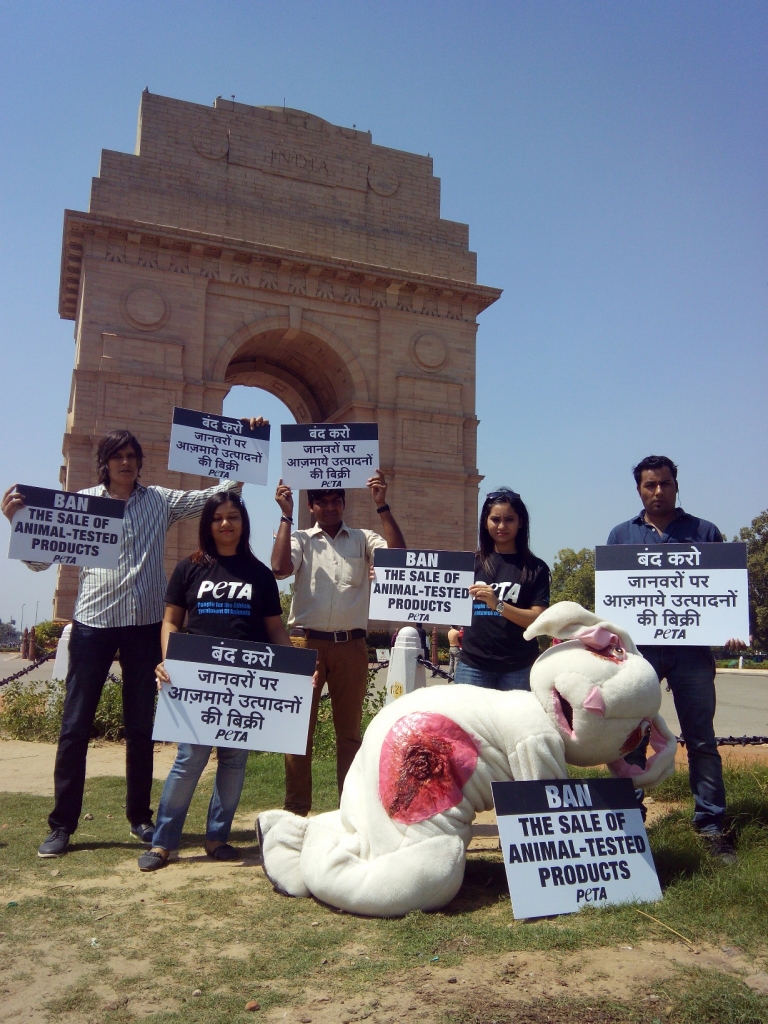How the Indian Cosmetics Bans Were Won
Ever wondered what it takes to win a PETA campaign?
PETA had been actively working towards a ban on animal tests for cosmetics in India for many years. The campaign gained momentum in 2012 because the Bureau of Indian Standards’ (BIS) cosmetics testing standards came up for revision. In 2014, victory was achieved with a ban on animal tests for cosmetics and a ban on the importation of animal-tested cosmetics.
Here’s how it happened, in 10 steps:
PETA is the only animal rights organisation to have an official seat on the BIS PCD 19 Cosmetics Sectional Committee.
All standards are reviewed every five years. The cosmetics Indian Standard 4011 was put up for review in 2012. PETA used its seat on the committee to propose the removal of animal tests and to suggest the inclusion of non-animal testing methods and ultimately succeeded in both. This progress paved the way for the legislative bans that passed in 2014.
We actively participated in BIS meetings from 2012 to 2014 in order to submit scientific comments that were compiled with the help of scientists from PETA and its affiliates as well as the PETA International Science Consortium.
PETA had met numerous times with the Union Minister of Health & Family Welfare, Dr Harsh Vardhan; the Drugs Controller General of India (DCGI), Dr GN Singh; the Secretary for the Ministry of Health & Family Welfare, Luv Varma; and the Additional Secretary for the Ministry of Health & Family Welfare, Dr Arun Kumar Panda, to request a ban on animal tests for cosmetics as well as one on the importation and sale of animal-tested cosmetics.

PETA’s Science Policy Adviser and Senior Education Coordinator with Union Minister of Health & Family Welfare, Dr Harsh Vardhan.
Before Minister Vardhan came into power, PETA had made progress with the previous Health Minister, Ghulam Nabi Azad, as well as the former Secretary for the Ministry of Health & Family Welfare.
PETA worked with numerous influential politicians to end animal tests for cosmetics and to help implement a ban on the importation of animal-tested cosmetics.
With the help of Gauri Maulekhi of People for Animals (PFA), the current Union Minister of Women & Child Development, Maneka Gandhi, who founded PFA, worked in numerous vital ways over the years to ensure that these bans would be passed. Minister Gandhi’s work for the campaign was invaluable, and the victories would likely not have been possible without her.
Others who urged the Ministry of Health & Family Welfare (MoHFW) or the Ministry of Consumer Affairs, Food and Public Distribution (MCAFD) to consider PETA’s request for a ban on animal tests for cosmetics included Sonia Gandhi, Congress President; Lal Krishna Advani, senior leader of the Bharatiya Janata Party (BJP); Santosh Chaudhary, former Minister of State for Health & Family Welfare; Kodikunnil Suresh, former Minister of State for Labour & Employment; Tariq Anwar, former Minister of State for Agriculture & Food Processing Industries; Abhijit Mukherjee, Member of Parliament from Jangipur constituency and son of President Pranab Mukherjee; Dr Mirza Mehboob, former Cabinet Minister of Health, Medical Education & Family Welfare for the government of Jammu and Kashmir; and Yashodhara Raje Scindia, former Minister for Tourism, Sports & Youth Welfare for the government of Madhya Pradesh.
Those who helped specifically with the importation ban included Dr Shashi Tharoor, former Minister of State for Human Resource Development; Arvind Sawant, Member of Parliament from South Mumbai; Basavaraj Patil, senior BJP leader of Karnataka; and AV Swamy, Member of Parliament and social worker from Odisha.
In 2008, the Indian Council of Medical Research wrote to the MoHFW supporting PETA’s request asking for a ban on animal tests for cosmetics.
In 2012, following request from PETA, the Mahatma Gandhi-Doerenkamp Center for Alternatives to Use of Animals in Life Science Education wrote to then–Health Minister Azad asking for a ban on animal tests for cosmetics and the Physicians Committee for Responsible Medicine wrote to the DCGI and Secretary Varma asking for a ban on animal tests for cosmetics and in favour of a ban on the importation of animal-tested cosmetics.
In 2012, the Animal Welfare Board of India, a statutory body operating under the Ministry of Environment & Forests, wrote to then-Minister Azad in favour of a ban on animal tests for cosmetics, and in 2014, after hearing from PETA, he wrote to Minister Vardhan asking him to ban the importation of animal-tested cosmetics.
PETA participated in numerous stakeholder meetings, including those organised by the MoHFW.
During these meetings – in May, July and September 2014 – PETA interacted with drug regulators; scientists from the BIS, the Indian Pharmacological Society and the Society of Toxicology; and industry groups such as the Indian Beauty & Hygiene Association (IBHA), the Federation of Indian Chambers of Commerce and Industry (FICCI), the Consumer Guidance Society of India, the All India Cosmetic Manufacturers Association and the All India Small Scale Cosmetic Manufacturers Association in order to persuade them to support the ban.
The first meeting in May, which was the most important, was a roundtable discussion with toxicologists, pharmacologists and industry representatives. PETA was the only animal rights organisation invited to this meeting.
Since the BIS meetings, PETA has been managing industry reluctance about the bans by communicating with the IBHA, the FICCI and individual industry representatives in various meetings and in other ways. PETA US also met with or spoke to high-level company representatives abroad.
The FICCI put together a document to submit to the Health Ministry, which, in its draft form, was in favour of weakening the cosmetics testing ban and arguing against the importation ban. PETA submitted an argument to the Health Ministry in response and urged other animal-protection groups to do the same.
Multinational companies The Body Shop and LUSH as well as Indian companies Trumount Cosmoceuticals, Future Skin, Omved Lifestyle, Shahnaz Husain and others also wrote to the MoHFW in full support of a ban on animal tests for cosmetics after hearing from PETA.
In 2012, the cast and crew of Farah Khan’s film Joker, directed by Shirish Kunder and starring Akshay Kumar, Sonakshi Sinha and Chitrangda Singh, joined PETA in urging the government to ban animal tests for cosmetics. For the campaign, Singh posed on behalf of PETA and Joker with the alien characters from the film.
The following celebrities signed a petition asking the MoHFW and the MCAFD to ban the sale of animal-tested cosmetics: Raveena Tandon-Thadani, Jacqueline Fernandez, Dia Mirza, R Madhavan, Rahul Khanna, Sunny Leone, Pooja Bhatt, Lara Dutta, Trisha Krishnan, Dino Morea, Esha Deol-Takhtani, Sarah-Jane Dias, Shweta Salve, Soniya Mehra, Suchitra Pillai, squash player Ritwik Bhattacharya and top models Acquin Pais, Alesia Raut, Anushka Manchanda, Binal Trivedi, Candice Pinto, Carol Gracias, Diandra Soares, Juhi Pande, Nethra Raghuraman, Pia Trivedi and Shonali Nagrani.
In 2014, actor Jacqueline Fernandez sent Minister Vardhan a letter and a bunny-shaped vegan cake with the words “Be Sweet to Bunnies – Ban Animal-Tested Products” written on it in tasty icing.
The following people took to Twitter in support of the campaign: Sonu Sood, Neha Dhupia, Amrita Rao, Ashmit Patel, Trisha Krishnan, R Madhavan, Natalia Villaveces, Priya Anand, Tamannaah Bhatia, Pamela Anderson, Esha Gupta, Sonakshi Sinha, Evelyn Sharma, Rahul Khanna, Anoushka Shankar, Poorna Jagannathan and Shashi Tharoor.
PETA has held numerous demonstrations over the years in Delhi and other cities in order to push for the bans. They often included people protesting in bunny costumes.
PETA posted multiple action alerts on its website, prompting thousands of people to write to the MoHFW and the MCAFD in favour of the ban on animal tests for cosmetics or the ban on the importation of animal-tested cosmetics.
One action alert we posted targeted the IBHA and the major companies that are its members, and PETA affiliates worldwide later posted similar action alerts.
The trade group was fighting against the importation ban and in favour of weakening the ban on animal tests for cosmetics.
PETA promoted all our action alerts via e-mail, Facebook and Twitter numerous times in order to rally support.
Lush Prize
In 2012, PETA won the LUSH cosmetics company’s first-ever global Lush Prize for our lobbying efforts to end animal tests for cosmetics. In 2013 and 2014, PETA was short-listed for an award in the lobbying category.
Next Steps
The importation ban on animal-tested cosmetics is scheduled to be implemented in November. PETA will now be meeting with the Ministry of Health, the Ministry of Commerce and the Directorate General of Foreign Trade to ensure that this new law is put into practice in the proper way. For now, consumers should continue to refer to this list of cruelty-free companies when shopping for cosmetics.
PETA’s Other Related Work
In January 2014, following input from PETA and support from Members of Parliament, the Soaps and Other Surface Active Agents Committee (CHD 25) of the BIS, which determines which tests are required under Indian Standards 11601 (Methods of Safety Evaluation of Synthetic Detergents – Tests for Skin Irritation and Sensitization Potential of Synthetic Detergents) and 13424 (Safety Evaluation of Bathing Bars and Toilet Soaps – Methods of Test), decided to remove animal tests from the requirements, thereby ending animal tests for household products, such as cleaners and detergents, and their ingredients.
PETA’s science policy adviser is the only representative from an animal-protection group to have an official seat on the committee that decided to remove the final remaining animal test – in which harsh chemicals were rubbed onto guinea pigs’ abraded skin – from the standards, replacing it with non-animal testing methods, which are followed by a test called the Human Repeated Insult Patch Test.



















